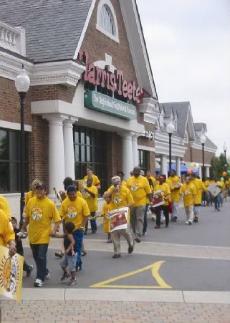A meatpacking plant in North Carolina is the center of a fierce battle over rights and control. On one side, the Smithfield Foods company and the other, the United Food and Commercial Workers.
Paul Bruce got some of the worst news a human being can get recently. He was diagnosed with cancer. Things would get much worse for him, however.
He’d been working at Smithfield Food’s pork processing plant in Tar Heel, N.C. for two years. He took time off from work to recover from painful chemotherapy. Little did he know, he would soon be fired.
“I worked at Smithfield for two years, but then they fired me ’cause I got sick,” said Bruce in a statement released by smithfieldjustice.org. “While I was in the hospital, they fired me for missing work and cut off my insurance. We lost everything: our home, our savings, even our car insurance.”
Paul Bruce’s story is one of many stories of unfair practices that come out of the Tar Heel plant.
The plant is the largest hog processing plant in the world. Each day, 32,000 hogs are killed, and 5,500 people work non-stop cutting meat.
The United Food and Commercial Workers (UFCW) union, which represents meatpackers, has been trying to organize the workers there for years. The union’s efforts have been fought brutally by the company.
The UFCW cites a plethora of reasons for the need for a union. Workers are routinely injured, fired, and denied workers compensation at the plant, according to the UFCW.
There are stories of workers whose repetitive-stress injuries were misdiagnosed or ignored by the company doctor. Some were told that their injuries weren’t work related, therefore making them ineligible for worker’s compensation.
The treatment of workers is one of the biggest issues surrounding the union drive, but the struggles for a fair and balanced election process have marred progress.
Union elections were last held in 1997 by way of secret ballot. During these elections, Smithfield was accused of using physical violence, illegal surveillance, and increased racial tensions in the plant to ensure a union loss.
Smithfield was later found guilty of these charges, and the 1997 election was considered invalid due to the biased and dangerous climate created by the company. Since the court ruling, Smithfield has been even more adamant about halting union activities.
The UFCW argues that workers are continually being intimidated, which is creating an impossible climate for fair elections. The UFCW wants the unionization of the plant to be decided by check-card voting.
Check-card voting is essentially signing union cards, as opposed to holding secret-ballot election. If a majority of workers sign cards, the plant becomes unionized. This method is highly controversial.
Smithfield argues that through signing union cards, the union is able to coerce employees to sign through peer pressure. Smithfield advocates the use of secret-ballot elections because they claim it gives all workers a voice.
The UFCW duly notes that secret ballot elections have repeatedly been compromised by the company’s illegal actions.
A few weeks ago, the ongoing feud between the two groups took a nasty turn. Smithfield filed a suit against the UFCW under the Racketeer Influenced and Corrupt Organizations (RICO) statue.
The RICO statue was created to and credited with destroying the Mafia and other organized crime groups.
“The company action constitutes hypocrisy of the highest order, seeking to hide behind a frivolous lawsuit,” the union said in a press release.
Smithfield has recently angered its employees even more. Smithfield has been found guilty of threatening their Latino workforce with calls to immigration authorities.
Recently immigration authorities raided the plant and arrested 25 workers. This prompted a walkout that slowed production, while showing solidarity amongst the workers.
The fight between the company and the union is clearly far from over and a finalized outcome is far out of reach.

